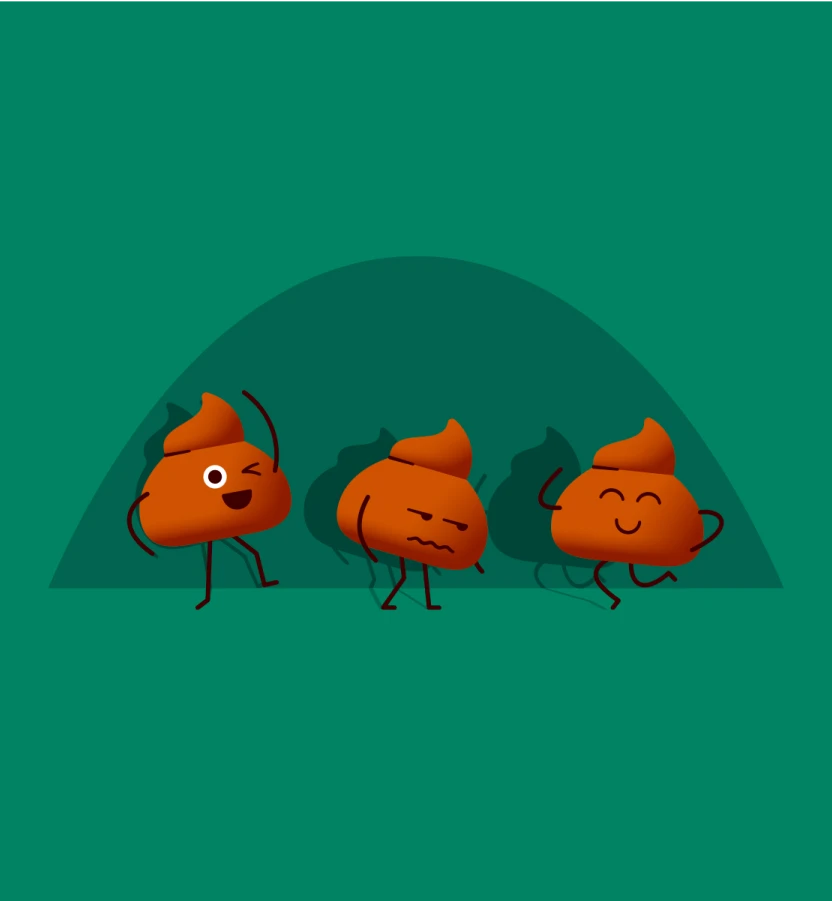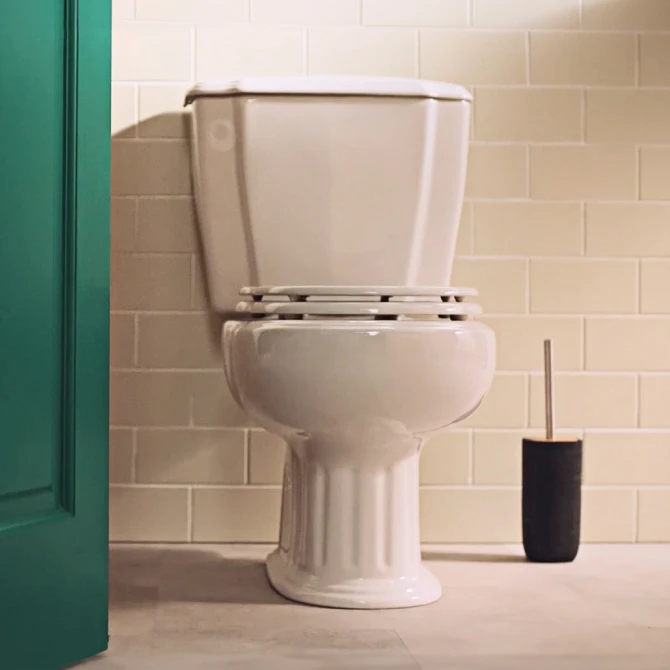
Constipation in children
Constipation is a widespread condition among infants and children1. As their bodies develop, they’ll go through a few important milestones, which may trigger it. This includes the introduction of solid foods, learning to use the toilet and starting school.
Constipation in children is recognised by infrequent, hard poo as well as accidents in their underwear. It can cause tummy ache as well as stress and upset for the child and their family2.
Why do children get constipated?
The most important thing with constipation in children or infants is being able to spot the signs and symptoms. The good news is that for 90 to 95% of children affected by constipation, there's no cause for concern.
Infants
- At least four soft, grainy, yellow discharges are considered normal per day. Breastfed babies poo more than formula-fed babies.
- With the start of weaning, pooing can become less frequent, but the poo remains soft.
- After one year of age, most babies produce soft but formed poo once or twice a day.
Children
Children can get constipated when they're anxious about something, like starting a new school or problems at home. Another cause may be a diet lacking in fibre. Some children avoid going to the bathroom, even when they really have the urge to go. Sometimes, medicines like antidepressants and those used to treat iron deficiencies can cause constipation.
Spotting the signs of constipation in children
If your child doesn't poo every day, it doesn't necessarily mean they're constipated. Some children go three times a day, while others go once every one to two days.
But there are several clear signs you can look out for, such as your child going less than usual or having trouble or pain when they poo. You might also see staining in their underwear or a little blood on the toilet paper3.
So your child might be constipated if they have4:
- Fewer than three poos a week
- Trouble having a poo
- Poo that's hard, dry, and unusually large
If your child's poos are hard and they often have to strain to poo or they feel pain while going - or perhaps they try to avoid going to the toilet - we recommend you speak to your doctor5,4.
What could be causing discomfort?
Most of the time, functional constipation in children is caused by painful poos. The pain can make your child want to avoid the unpleasantness altogether - and withhold their poo. Other causes include toilet training, changes in routine or diet, stressful events and illness. And sometimes, your child might hold in their poo because they aren't near a toilet, and that can make them constipated.6
Diet with a low intake of fibre
Constipation in children can be due to a diet that doesn't include enough fibre and enough fluid. Both help the bowels move as they should. Processed foods and fatty, sugary, or starchy foods can slow the bowels down4.
In certain children who don't respond to behavioural and medical management, constipation could also be linked to an intolerance of milk proteins. In this case, the suspected allergy trigger is usually removed from the child’s diet for 2-4 months to assess the involvement of milk proteins7.
Other causes
Functional constipation in children may result from withholding poo. Sometimes, children do this to avoid unpleasantness, such as anal fissures which cause pain, or simply because they're too busy to go8.
In some rare cases, constipation in children may be linked to a physical disorder or to the use of a specific drug. This is what's called organic constipation. In these rare cases, constipation is a sign of other medical illnesses. So talk to your doctor if your child continues to have problems or if the constipation lasts for 2 to 3 weeks3,4,8.
How to prevent occasional constipation in children
Once your doctor has told you your child is constipated, there are a few simple things you can do to help them feel better and develop helpful toilet habits. Children tend to imitate adults. So setting the right example by eating healthily can have a long-term effect on their diet (and yours!).
1. Serve a healthier, fibre-rich diet
A high-fibre diet is essential for children to maintain healthy digestion and prevent constipation. Fibre can't be digested, so it helps clean out the intestines by moving the bowels along. When adding more fibre to your child's diet (including fresh fruits, vegetables and also yoghurts), do so slowly over a few weeks. Also make sure your child drinks more liquids.
2. Develop healthy habits
If you haven't yet, develop a regular meal schedule. Eating is a natural stimulant for the bowels, so consistent meals can help keep things regular in the toilet department. You can also help your child create their own toilet routine by encouraging them to use the loo in the morning or after eating. Also make sure they get enough exercise. Physical activity nudges the bowels into action.
Sources
- Müller-Lissner SA, Kamm MA, Scarpignato C, Wald A. Myths and misconceptions about chronic constipation. Am J Gastroenterol. 2005 Jan;100(1):232-42.
- Benninga MA, Candy DC, Taminiau JA. New treatment options in childhood constipation? J Pediatr Gastroenterol Nutr. 2005 Sep;41 Suppl 1:S56-7.
- Loening-Baucke V. Chronic constipation in children. Gastroenterology. 1993 Nov;105(5):1557-64.
- Murren-Boezem, J. Constipation (KidsHealth). Department of Nemours Childrens Urgent Care. 2018. https://kidshealth.org/en/parents/constipation.html
- Loening-Baucke V. Prevalence, symptoms and outcome of constipation in infants and toddlers. J Pediatr. 2005 Mar;146(3):359-63.
- Gordon M, MacDonald JK, Parker CE, Akobeng AK, Thomas AG. Osmotic and stimulant laxatives for the management of childhood constipation. Cochrane Database Syst Rev. 2016 Aug 17;2016(8):CD009118.
- Carroccio A, Iacono G. Review article: Chronic constipation and food hypersensitivity--an intriguing relationship. Aliment Pharmacol Ther. 2006 Nov 1;24(9):1295-304.
- Constipation Guideline Committee of the North American Society for Pediatric Gastroenterology, Hepatology and Nutrition. Evaluation and treatment of constipation in infants and children: recommendations of the North American Society for Pediatric Gastroenterology, Hepatology and Nutrition. J Pediatr Gastroenterol Nutr. 2006 Sep;43(3):e1-13. doi: 10.1097/01.mpg.0000233159.97667.c3. PMID: 16954945.
.webp)









.webp)
